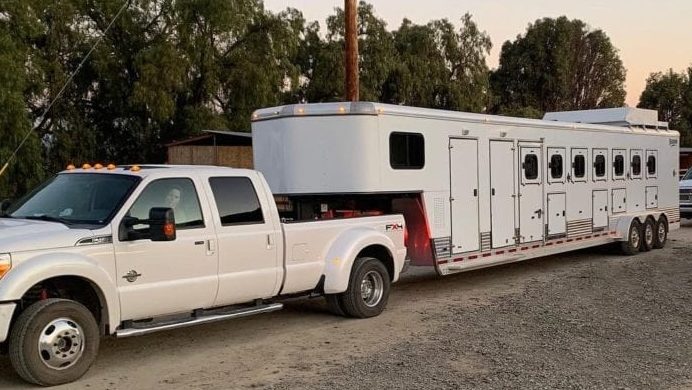If you have been in the horse industry long enough, there has probably been a time when you broke down on the roadside. On a busy interstate, it can be nerve-racking and dangerous. You can sometimes feel the cars and semi-trucks whizzing by, convinced they are about to crash into you. Having a truck and trailer with horses aboard makes it even more difficult to receive help on the road.
Since equestrians are constantly on the road headed to horse shows, we wanted to ask some trainers and non-pros their advice that has helped them when they have been in this situation and ways to prevent blowouts and possible breakdowns.
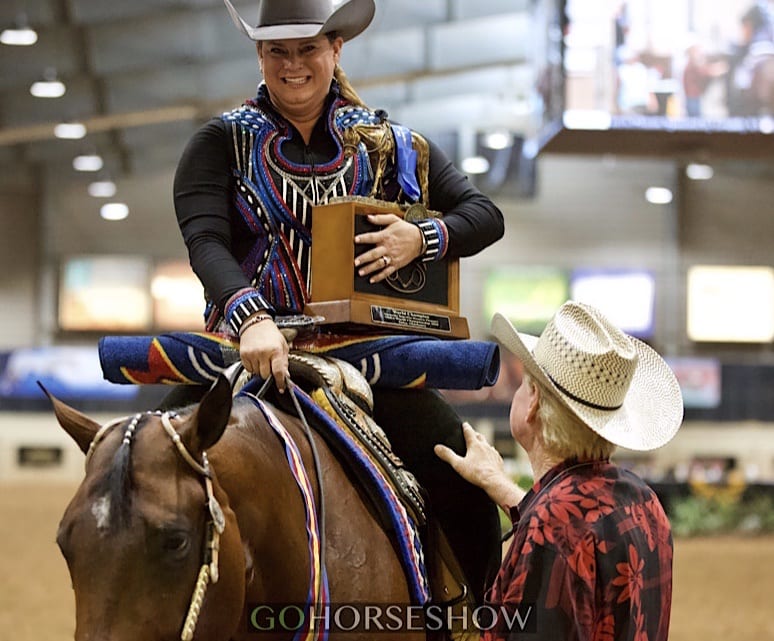 Nancy Ditty – Oh, yes, I do belong to the “Special Group” that has been on the side of the road in the middle of the night, broke down unloading horses into the ditch, holding on to two yearlings at a time and one being a stallion…not an excellent place to be.
Nancy Ditty – Oh, yes, I do belong to the “Special Group” that has been on the side of the road in the middle of the night, broke down unloading horses into the ditch, holding on to two yearlings at a time and one being a stallion…not an excellent place to be.
I do practice safety tips. Some easy ones to follow are, first of all, to keep your trailer and truck serviced. I firmly believe that once a year, have your trailer inspected and gone through. The tires, brakes, and bearings are critical for keeping you moving down the highway. Keep the communication between yourself and your preferred service shop open.
Ask questions like: What speed are my tires rated to go? Most are only rated to go at 70-75 miles per hour. This is one of the biggest reasons that many fellow exhibitors have breakdowns. How can we increase the airflow between the fender and the tires as the weather and the roads are so hot these days? What is the desired tire pressure that I should maintain while traveling?
Some tire dealers say to keep the tires underinflated, so while they heat up and expand, you allow for that. Should I fill our tires with Helium instead of air? We enforce this practice at our dealerships, Coast to Coast and Nelson’s.
We also encourage that everyone carry US Rider. This long-standing company will do whatever they can in the area you are broken down in to help you with the horses and the truck and trailer. They specialize in this type of situation.
Compete walk-arounds should always be performed before leaving the farm. Not just the brakes, but also the lights, the chains, and the Coupler Lock/Pin to ensure you are all hooked up.
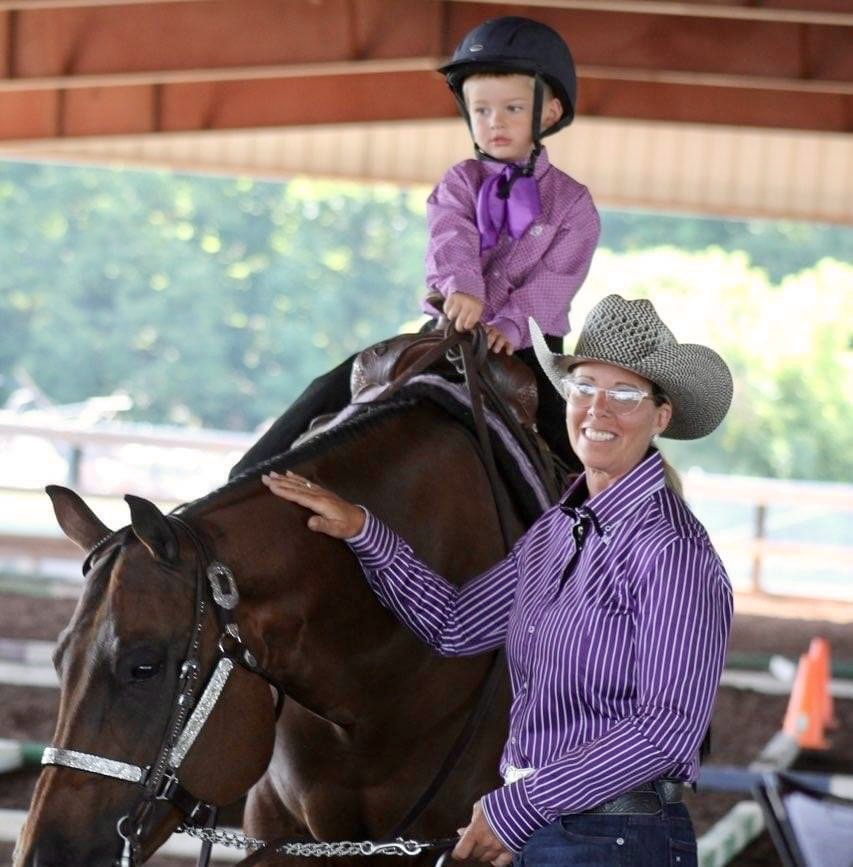 Dodie Howard – Breaking down on the interstate with horses is a big worry for most when they make long hauls. We avoid them as best as possible by always doing a maintenance check before leaving home. How are the tires? Fuel filters? Wheel bearings? Brakes? Etc. Over the years, it’s usually just been the occasional flat tire, but I now carry an impact and socket set. It makes changing it so much easier. I’ve had wheel bearings go, lousy fuel, water pumps, and turbos…most of which are uncontrollable.
Dodie Howard – Breaking down on the interstate with horses is a big worry for most when they make long hauls. We avoid them as best as possible by always doing a maintenance check before leaving home. How are the tires? Fuel filters? Wheel bearings? Brakes? Etc. Over the years, it’s usually just been the occasional flat tire, but I now carry an impact and socket set. It makes changing it so much easier. I’ve had wheel bearings go, lousy fuel, water pumps, and turbos…most of which are uncontrollable.
I’m lucky to have my father in another rig with us somewhere. He is so handy and can fix most things in a jam. He usually gets it done, even if it’s just enough to get us home. (So very thankful!) The biggest worry is usually water if we are on a long trip. We always have hay but carrying a little extra water in a tank is always a good idea. We carry flares as well. Hoping people stay in the passing lane when they have to go by you, but some people don’t move over. We try to always pull over in a safe spot but sometimes can’t always control that.
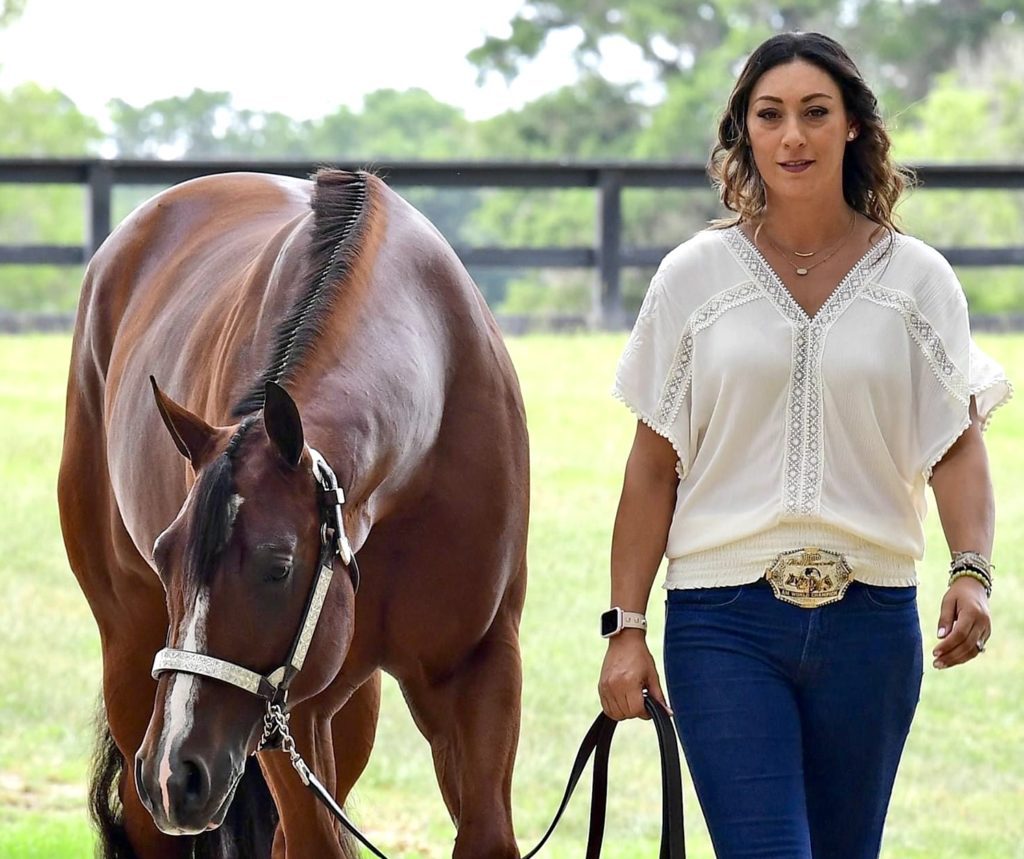 Ashley Enoch-Scott – I have broken down before, and I highly recommend a roadside service. It makes life a lot easier. I always ensure I have tire-changing supplies, water for horses, and extra hay, and I always pull off the road. Usually, we always check tires and bearings if we are going three hours or longer. In addition, I always do a once-over of the trailer each time I hook up.
Ashley Enoch-Scott – I have broken down before, and I highly recommend a roadside service. It makes life a lot easier. I always ensure I have tire-changing supplies, water for horses, and extra hay, and I always pull off the road. Usually, we always check tires and bearings if we are going three hours or longer. In addition, I always do a once-over of the trailer each time I hook up.
 Erica Owen – Before you leave:
Erica Owen – Before you leave:
– Check air and tire pressure
-Make sure you have buckets and hay easily accessible
-Fill your water tank
-Scope out and book layover places
-Get roadside assistance insurance, like US Rider
-Make sure to have electrolytes handy
-Have provisions for yourself
While Driving:
-Check your mirrors often
-Check your tires and the horses at every stop
-Don’t let your fuel tank get below 1/4 tank
-Try to keep a safe distance between yourself and other vehicles on the highway
If you’re broken down:
-Get as far off the highway as possible
-Don’t unload the horses unless necessary
-Don’t stand outside the vehicle to wait for help
Things I carry/do:
-Tire iron, breaker bar, lug nut key, and my firearm
-I leave the lead ropes attached, just thrown over their necks, in case of an emergency
 Ceralena Gray – We keep US Rider as additional insurance. They’ve been a fantastic asset during those few times we have had issues. I’m blessed that Jeremy keeps our rigs in check and stays on top of maintenance and tires, but those unfortunate events happen. We keep a jack, blocks, impact, etc., in any trailer we haul. We spun a barring on the turnpike on the way to Tulsa one year, and some great friends, Don McGee, lived close and came to our rescue to haul our horses the last 30 mins. Luckily the horse world is such a tight community. It’s not uncommon to see strangers jump to help each other out when horses are stuck on the side of the road.
Ceralena Gray – We keep US Rider as additional insurance. They’ve been a fantastic asset during those few times we have had issues. I’m blessed that Jeremy keeps our rigs in check and stays on top of maintenance and tires, but those unfortunate events happen. We keep a jack, blocks, impact, etc., in any trailer we haul. We spun a barring on the turnpike on the way to Tulsa one year, and some great friends, Don McGee, lived close and came to our rescue to haul our horses the last 30 mins. Luckily the horse world is such a tight community. It’s not uncommon to see strangers jump to help each other out when horses are stuck on the side of the road.
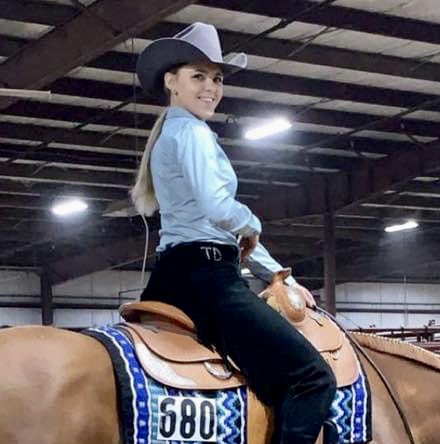 Tessa Dalton – Thankfully, we have only broken down once, and it was something so simple as a flat tire. We were stuck on the side of the road for 7 hours at 2 am, returning to Michigan from a show in Cloverdale. Lesson learned from that. I purchased US Rider. If you ever break down on the side of the road, they come right to you. If your truck breaks down, they will find one for you to use. If your trailer breaks down, they will help you get your horses somewhere safe. I think it’s about $3-400 for the year – worth it. If we get stuck on the road, we always carry flares and cones in our trailer so people can see us.
Tessa Dalton – Thankfully, we have only broken down once, and it was something so simple as a flat tire. We were stuck on the side of the road for 7 hours at 2 am, returning to Michigan from a show in Cloverdale. Lesson learned from that. I purchased US Rider. If you ever break down on the side of the road, they come right to you. If your truck breaks down, they will find one for you to use. If your trailer breaks down, they will help you get your horses somewhere safe. I think it’s about $3-400 for the year – worth it. If we get stuck on the road, we always carry flares and cones in our trailer so people can see us.
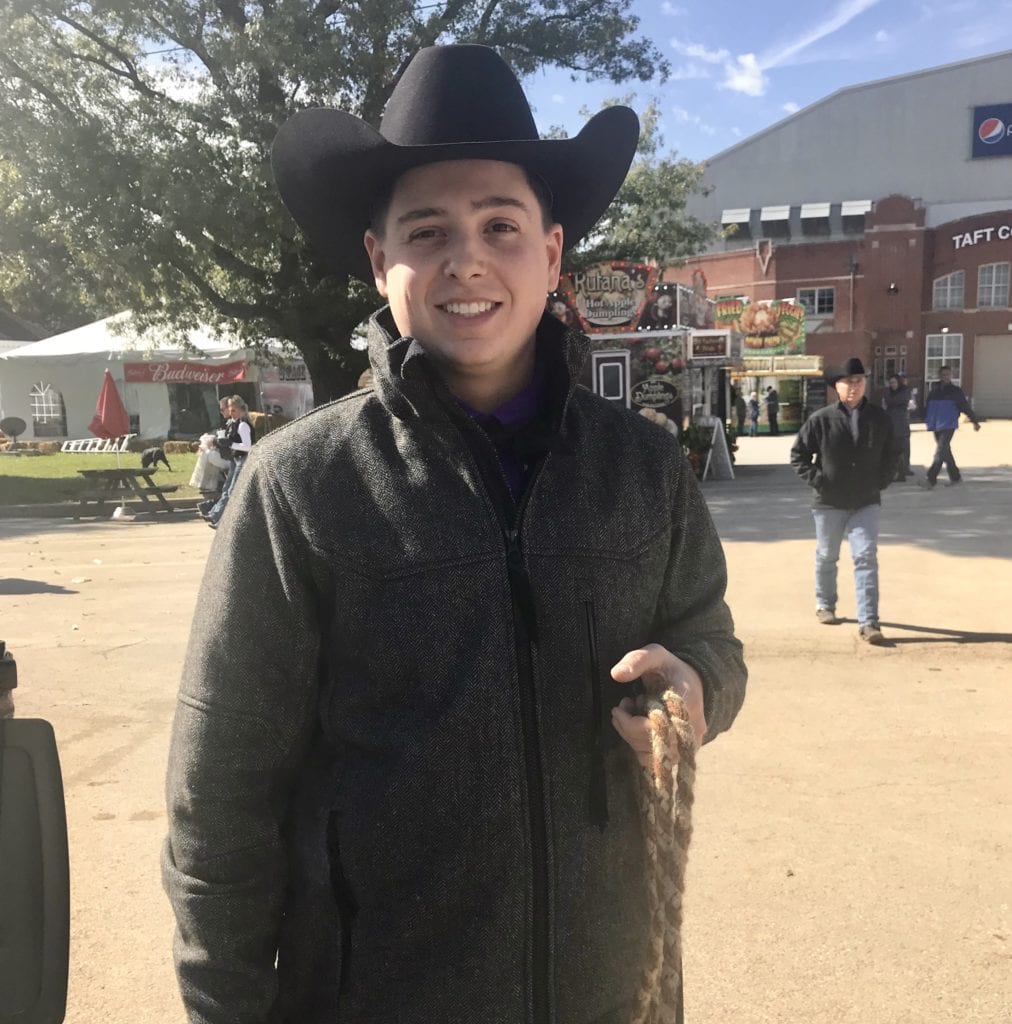 Austin Gooding – We are always sure to double and triple-check a few things the days before leaving, especially before long trips. The primary things we look at are that all of our tires are in good condition and at the correct PSI. Our trailer battery controls whether we have trailer brakes or not, so the day before leaving, we will always get the battery on a charger to be sure it’s fully charged. And then, of course, we are constantly confident we have the necessary tools in the trailer if we have a blowout. An impact wrench for changing tires saves a ton of time. We’ve been lucky not to be stranded in recent memory, but we have had bad luck with tires blowing on our last couple of longer trips. Between my dad and me, we have gotten pretty quick at getting them changed out and back on the road, and we always try to get to a safe spot to pull off before we try doing so.
Austin Gooding – We are always sure to double and triple-check a few things the days before leaving, especially before long trips. The primary things we look at are that all of our tires are in good condition and at the correct PSI. Our trailer battery controls whether we have trailer brakes or not, so the day before leaving, we will always get the battery on a charger to be sure it’s fully charged. And then, of course, we are constantly confident we have the necessary tools in the trailer if we have a blowout. An impact wrench for changing tires saves a ton of time. We’ve been lucky not to be stranded in recent memory, but we have had bad luck with tires blowing on our last couple of longer trips. Between my dad and me, we have gotten pretty quick at getting them changed out and back on the road, and we always try to get to a safe spot to pull off before we try doing so.
 Leonard Berryhill – First on my list is tires. I check and keep the pressure where the manufacturer says it should be. I change tires every three years, no matter what. It’s a significant expense, but when you’re on the side of the road, I have sure wished I had new tires. Be careful how you drive. These tires are rated for speed, and exceeding those speeds puts undo stress on them. Also, what breaks down in trailer tires are the sidewalls. Limit sharp turns as much as possible and keep that trailer between the lines. Running onto the shoulder can wreck your sidewalls. I carry an electric impact wrench and a wedge that I can drive my trailer up onto. It cuts your time at least in half for changing a tire. I treat my truck tires the same way. Under-inflated tires are a blowout waiting to happen! We carry a AAA plan that includes our trailer…just in case. There is no good place to have a flat or a breakdown, and I have broken down in the tightest and scariest places, and all you can do is do the best you can to get to an off-ramp or a wide shoulder, and hopefully, you are close to civilization.
Leonard Berryhill – First on my list is tires. I check and keep the pressure where the manufacturer says it should be. I change tires every three years, no matter what. It’s a significant expense, but when you’re on the side of the road, I have sure wished I had new tires. Be careful how you drive. These tires are rated for speed, and exceeding those speeds puts undo stress on them. Also, what breaks down in trailer tires are the sidewalls. Limit sharp turns as much as possible and keep that trailer between the lines. Running onto the shoulder can wreck your sidewalls. I carry an electric impact wrench and a wedge that I can drive my trailer up onto. It cuts your time at least in half for changing a tire. I treat my truck tires the same way. Under-inflated tires are a blowout waiting to happen! We carry a AAA plan that includes our trailer…just in case. There is no good place to have a flat or a breakdown, and I have broken down in the tightest and scariest places, and all you can do is do the best you can to get to an off-ramp or a wide shoulder, and hopefully, you are close to civilization.
 Hilary Reinhard – Thankfully, tire blowouts were the only breakdowns I’ve had while hauling horses. So, I’ve always learned to have good tires. Always have two spares, and make sure they hold air. Finding out in Kingman on the way to Oklahoma that your spare tire is a dud isn’t fun. We also carry portable tire inflator plugs in the car to air up any slow leaking tires if necessary. The tire iron and the plastic tire ramp are packed in a spot that is easy to access without unloading the entire trailer. For the safety of the horses, we don’t haul them during the day through the desert. Instead, we haul at night, so the horses stay more relaxed and aren’t in the heat if we have a breakdown. I always check the oil before we leave the ranch. And have a spare quart in the rig.
Hilary Reinhard – Thankfully, tire blowouts were the only breakdowns I’ve had while hauling horses. So, I’ve always learned to have good tires. Always have two spares, and make sure they hold air. Finding out in Kingman on the way to Oklahoma that your spare tire is a dud isn’t fun. We also carry portable tire inflator plugs in the car to air up any slow leaking tires if necessary. The tire iron and the plastic tire ramp are packed in a spot that is easy to access without unloading the entire trailer. For the safety of the horses, we don’t haul them during the day through the desert. Instead, we haul at night, so the horses stay more relaxed and aren’t in the heat if we have a breakdown. I always check the oil before we leave the ranch. And have a spare quart in the rig.
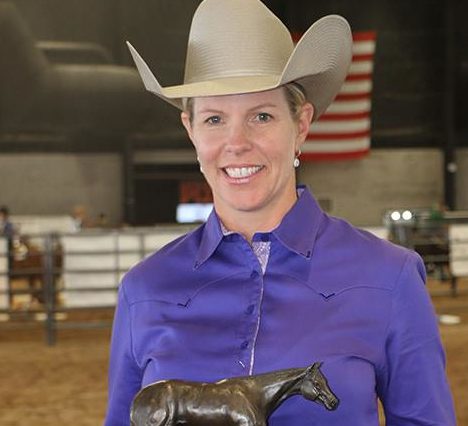 Kellie Hinely – I went through about a year of blowing tires, so I’m well versed at breakdowns.
Kellie Hinely – I went through about a year of blowing tires, so I’m well versed at breakdowns.
1. Pull as far off the highway as possible.
2. I carry hazard triangles that I put a few hundred feet from the trailer.
3. Have tire-changing tools easily accessible.
4. Make sure your spare is useable.
5. I always carry water. I broke down on a highway with little cell service; the only tow company was five hours out. Thank goodness for water in the truck.
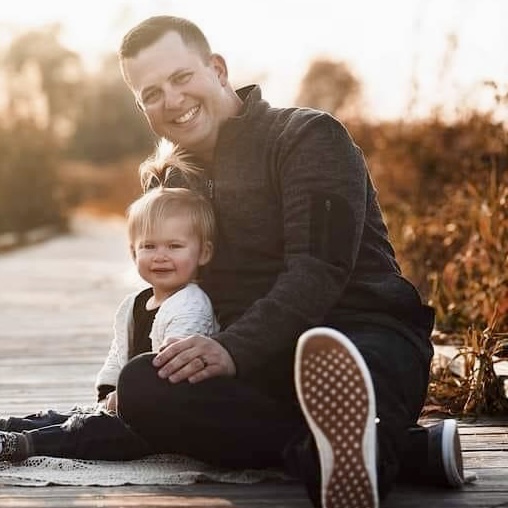 Travis Born – I’ve been fortunate so far. Besides the occasional blown tire, I’ve never been broken down or stranded anywhere. The best kind of maintenance is preventive maintenance. Get your truck and trailer serviced regularly. I check tire pressure before every trip. I always have a tire iron or impact wrench in each truck and blocks to drive up on to change a tire. I also feel it’s essential to take your time while traveling and not push your equipment to the limit, especially in hot weather. It’s better to take a little extra time going from one place to the next versus being stuck on the side of the road.
Travis Born – I’ve been fortunate so far. Besides the occasional blown tire, I’ve never been broken down or stranded anywhere. The best kind of maintenance is preventive maintenance. Get your truck and trailer serviced regularly. I check tire pressure before every trip. I always have a tire iron or impact wrench in each truck and blocks to drive up on to change a tire. I also feel it’s essential to take your time while traveling and not push your equipment to the limit, especially in hot weather. It’s better to take a little extra time going from one place to the next versus being stuck on the side of the road.
 Margaux Tucker – I have been broken down before. It seems that no matter how hard you try, trucks and trailers take a beating. Long hauls, heat, cold, heavy loads, etc., all take a toll. My best advice is to have a fire extinguisher, have a high-quality jack or trailer ramp that gets high enough and is easy to drive on, and always know your surroundings and check on barns/horse people along your route in case you need to get horses to a safe location quickly. We offer a layover service at our barn and have helped many stranded equestrian travelers if they have problems. It is the least we can do for others in the equine community.
Margaux Tucker – I have been broken down before. It seems that no matter how hard you try, trucks and trailers take a beating. Long hauls, heat, cold, heavy loads, etc., all take a toll. My best advice is to have a fire extinguisher, have a high-quality jack or trailer ramp that gets high enough and is easy to drive on, and always know your surroundings and check on barns/horse people along your route in case you need to get horses to a safe location quickly. We offer a layover service at our barn and have helped many stranded equestrian travelers if they have problems. It is the least we can do for others in the equine community.
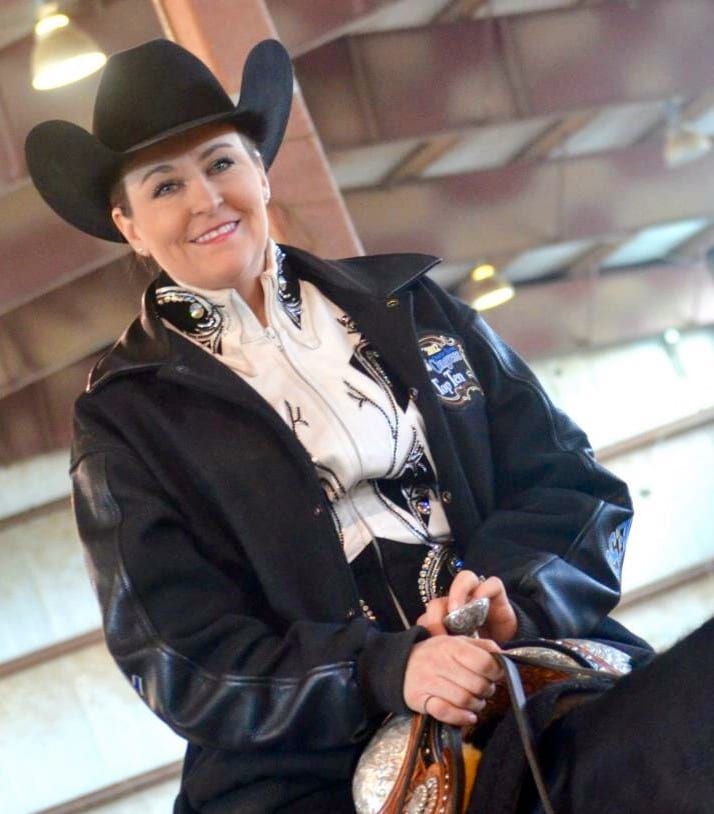 Melissa Shetler – We have unfortunately had to deal with the situation more than once. Luckily I have US Rider. They help locate a nearby barn if needed and provide many types of assistance. I always keep a jack and tools to change a tire if possible. My husband checks my tires and bearings regularly. I also have a customer that is my “tire guy.” He always lets me know when they need to be replaced. Surrounding yourself with knowledgeable help is essential.
Melissa Shetler – We have unfortunately had to deal with the situation more than once. Luckily I have US Rider. They help locate a nearby barn if needed and provide many types of assistance. I always keep a jack and tools to change a tire if possible. My husband checks my tires and bearings regularly. I also have a customer that is my “tire guy.” He always lets me know when they need to be replaced. Surrounding yourself with knowledgeable help is essential.
Do you have any tips on remaining safe during trailer breakdowns or things you implement to try and prevent them? We’d love to hear your story.


